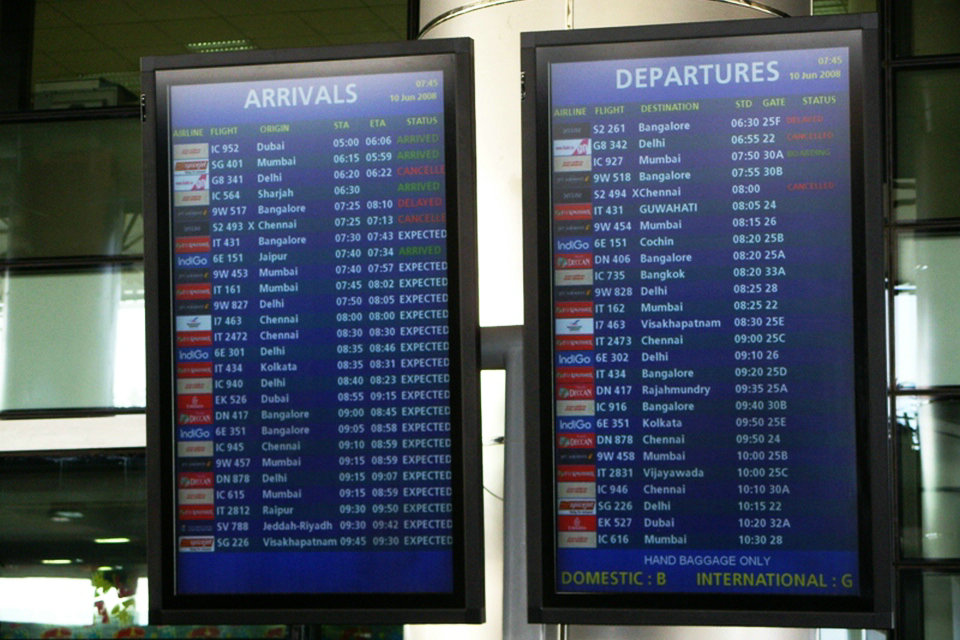Flight cancellation and delay


A flight delay is when an airline flight takes off and/or lands later than its scheduled time. The Federal Aviation Administration (FAA) considers a flight to be delayed when it is 15 minutes later than its scheduled time. A cancellation occurs when the airline does not operate the flight at all for a certain reason.
In the European Union, Flight Compensation Regulation 261/2004 states that flight delays for over three hours, cancellations and denied boarding entitles passengers to a compensation from €250 up to €600 per passenger from the airline.
In the United States, when flights are canceled or delayed, passengers may be entitled to compensation due to rules obeyed by every flight company, usually Rule 240, or Rule 218 in certain locations. This rule usually specifies that passengers may be entitled to certain reimbursements, including a free room if the next flight is the day after the canceled one, a choice of reimbursement, rerouting, phone calls, and refreshments. When a flight is delayed, the FAA allocates slots for takeoffs and landings based on which flight is scheduled first. The Transportation Department imposes a fine of up to $27,500 per passenger for planes left on the tarmac for more than three hours without taking off (four hours for international flights). In the United States, passengers are not entitled to compensation when a delay occurs, not even a cut of fees airlines must pay federal authorities for long delays. Airlines are required to pay for lodging costs of passengers if the delay or a cancellation is through their own fault, but not if the cause is beyond their control, such as weather.
Causes
Since 2003, the United States Bureau of Transportation Statistics has been keeping track of the causes of flight delays. The number of flight delays has increased as staff has been cut back as a result of the financial woes following the September 11 attacks.
Some of the causes of flight delays or cancellation include:
Airline glitches. The top cause of flight delays, according to a USA TODAY analysis.
Congestion in air traffic
Earthquakes and tsunamis (e.g., in the event of 2004 Indian Ocean earthquake and tsunami, 2010 Chile earthquake, and the 2011 Tōhoku earthquake and tsunami)
Fueling
Inclement weather, such as thunderstorm, hurricane, or blizzard
Late arrival of the aircraft to be used for the flight from a previous flight
Maintenance problems with the aircraft
Security issues
Terrorist attacks (e.g., suicide bombing in the event of Domodedovo International Airport bombing, the 2016 Brussels bombings, and the 2016 Atatürk Airport attack)
Effects
Cost to airlines
In the United States, the Federal Aviation Administration estimates that flight delays cost airlines $22 billion yearly. Airlines are forced to pay federal authorities when they hold planes on the tarmac for more than three hours for domestic flights or more than four hours for international flights.
Cost to passengers
Flight delays are an inconvenience to passengers. A delayed flight can be costly to passengers by making them late to their personal scheduled events and commitments. A passenger who is delayed on a multi-plane trip could miss a connecting flight. Anger, frustration and even Air rage can occur in delayed passengers.
Related regulations for delayed flights
In the United States, the Federal Transit Authority collects a $ 27,500 non-penal fine per passenger if it does not take off for more than 4 hours on delay.
Passengers will be compensated for up to 600 euros from airlines in case of cancellation or refusal of boarding if delay is over 3 hours in Europe. (See Regulation – 261/2004)
Relevant regulations for canceled flights
Passengers will be compensated for up to 600 euros from airlines in case of cancellation or refusal of boarding if delay is over 3 hours in Europe. (See Regulation – 261/2004)
Source from Wikipedia